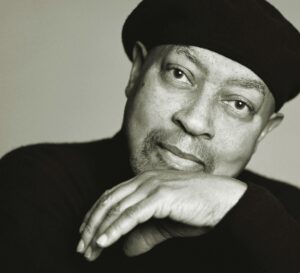
Display caption
Image: Kenny Barron. Credit: Courtesy of the artist.
Kenny Barron was born in Philadelphia in 1943 and while a teenager, started playing professionally with Mel Melvin’s orchestra. This local band also featured Barron’s brother Bill, the late tenor saxophonist.
Kenny had worked with drummer Philly Joe Jones while still in high school and by age 19, he had moved to New York City where he freelanced with Roy Haynes, Lee Morgan and James Moody, after the tenor saxophonist heard him play at the Five Spot. With Moody’s recommendation, Dizzy Gillespie hired Barron in 1962 without even hearing him play a note. In Dizzy’s band Kenny developed an appreciation for Latin and Caribbean rhythms. After five years with Dizzy, Barron played with Freddie Hubbard, Stanley Turrentine, Milt Jackson, and Buddy Rich. The early ’70s found Kenny working with Yusef Lateef who Kenny credits as a key influence in his art for improvisation. Encouraged by Lateef to pursue a college education, Barron balanced touring with studies and earned his B.A. in Music from Empire State College. By 1973, Kenny joined the faculty at Rutgers University as professor of music. He held this tenure until 2000, mentoring many of today’s young talents including David Sanchez, Terence Blanchard and Regina Belle. In 1974, Kenny recorded his first album as a leader for the Muse label entitled, Sunset To Dawn.
Following stints with Ron Carter in the late ’70s, Kenny formed a trio with Buster Williams and Ben Riley which also worked alongside of Eddie “Lockjaw” Davis, Eddie Harris, Sonny Stitt and Harry “Sweets” Edison. Throughout the 80s Barron collaborated with the great tenor saxophonist Stan Getz, touring with his quartet and recording several legendary albums including Anniversary, Serenity and the Grammy-nominated People Time. Also during the ’80s, he co-founded the quartet Sphere, along with Buster Williams, Ben Riley and Charlie Rouse. Sphere focused on the music of Thelonious Monk and recorded several outstanding projects for the Polygram label, among them Four For All and Bird Songs. After the death of Charlie Rouse, the band took a 15-year hiatus and reunited, replacing Rouse with alto saxophonist Gary Bartz. This reunion made its debut recording for Verve Records in 1998.
Kenny Barron’s own recordings for Verve have earned him nine Grammy nominations beginning in 1992, including: People Time, Sambao, Freefall, Spirit Song, Night and the City, and Wanton Spirit. Spirit Song, Night and the City, and Wanton Spirit each received double-Grammy nominations – for album and solo performance. His CD, Canta Brasil was named Critics’ Choice Top Ten CDs of 2003 by Jazziz Magazine. His 2004 release, Images was inspired by a suite originally commissioned by The Wharton Center at Michigan State University and features multi-Grammy nominated vibraphonist Stefon Harris. The long-awaited trio sequel featuring Ray Drummond and Ben Riley, The Perfect Set, Live At Bradley’s, Part Two was released in October 2005. In spring 2008, Mr. Barron released his first studio recording in four years with The Traveler, an intoxicating mix of favorite Barron tunes set to lyrics and newly penned compositions.
Barron consistently wins the jazz critics and reader’s polls, including Downbeat, Jazz Times and Jazziz magazines. In 2005, he was inducted into the American Jazz Hall of Fame and won a MAC Lifetime Achievement Award. He is a six-time recipient of Best Pianist by the Jazz Journalists’ Association and was as a finalist in the prestigious 2001 Jazz Par International Jazz Award.
Whether he is playing solo, trio or quintet, Kenny Barron is recognized the world over as a master of performance and composition.
*Bio from Award presentation.